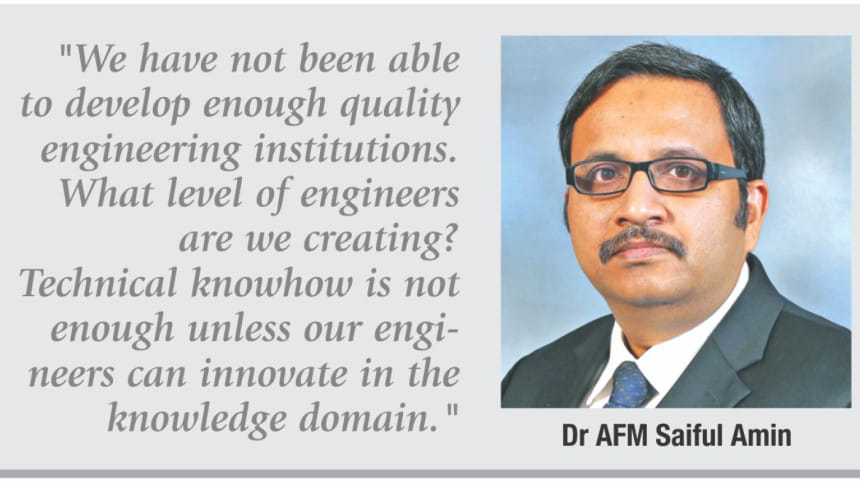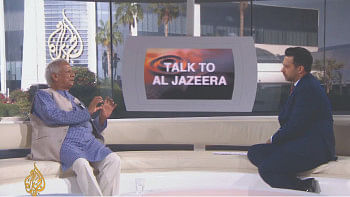'Safe housing should be part of education'

As the development of the country progresses, the need for awareness regarding infrastructure operation, maintenance and safety has become critical. At the same time, the issue of higher education—the quantity and quality of engineering professionals and the innovation that they can bring to the knowledge domain—now needs attention.
Professor Dr AFM Saiful Amin, explains how the benefits of awareness regarding safe construction can be seen both in tangible and intangible terms. We would not only see increased awareness regarding the use of materials and better maintenance and proper use when it comes to public infrastructure, but would also foster more discussions, debates and research.
Mass education and awareness
Dr Amin opines that in terms of awareness there can be no alternative to mass education. Bangladesh today boasts an adult literacy rate of 72.76 percentage (UNESCO). This is the time to take the opportunity to redefine literacy and introduce aspects of safe housing in schools. "You can teach students about what makes housing unsafe, the need for proper foundations so that the building can withstand its own weight and also about safety from natural disasters," he says.
Dr Amin says that most people still lack awareness. So, only introduction of these topics at the school and college level will not do—for adults, mass awareness programmes are needed. The benefits will not be immediate. But, as he says: "If people are aware of the issues, they will learn to demand for safe construction practices and proper planning." Users will understand the need for expert engineers and technicians, the importance of using proper materials in construction, and of maintenance.
"For public infrastructure, like roads and bridges, people will start feeling a better sense of ownership, and thus use these properly," he says. Even though the scope of public construction is massive, general people usually do not have a say in these, says Dr Amin. They are, in effect, just users. "Mass awareness is needed so that people feel a sense of ownership. Without ownership issues like bridge overloading, misuse of roads, will continue," he says.
"For example, operation and maintenance of metro rail, a new mode of transport will be a challenge without mass awareness. In Singapore, they had to ban chewing gum after they noticed that gum litter was disrupting the smooth running of the mass rapid transit (MRT) trains. It was possible to implement the ban because the country is small." For us, we need to bring these issues under education, to ensure proper use and maintenance.
We have already lost some things due to lack of awareness. "Today, we drive on the wrong side of the road, do not maintain lanes, use horns indiscriminately—these are things which will take time to fix," says Dr Amin.
With education will also come the awareness regarding proper use of material in construction. "Use of steel in construction may increase as steel and concrete will compete in the our market in the near future. Today use of concrete is higher because the initial cost of steel is higher than concrete. But taking into account the lifecycle cost, steel is ultimately cheaper than concrete in several projects." With education, people will start understanding these things, Dr Amin says.
Role of universities and research
The issue of what role universities can play also needs much thought according to Dr Amin. "There are two paths we can follow. One is to be reliant on foreign technology, which we can get through buying them. The other is to research and creation on our own," he says. But we cannot start from scratch. Dr Amin says: "We need a research pool which can grasp foreign technology, which is aware of the trends. So if we bring something from outside, they can understand and adapt the technology for us."
"We have not been able to develop enough quality engineering institutions across the country. What level of engineers are we creating? Technical knowhow is not enough unless our engineers can innovate in the knowledge domain. Development of skill is important. For that we need to develop the quality and quantity of institutions of higher learning across the country," says Dr Amin. He explains that the number of quality engineers we create is not enough for our demand. So now we gradually have to depend heavily on foreign engineers for mega-projects. "In the '80s Malaysia used to take engineers from us, now they are self sufficient. It took them 20–30 years—they invested in this area. If we take initiatives now, we can do this coming days."
Maintenance and a culture of safety
In our country, if we look around, we frequently see houses with rods sticking out of the roofs. "This shows that we are planning and designing more than our capacity. We build two stories, and then when we have money, we extend another floor. So, where is the budget for maintenance?" asks Dr Amin. "Maintenance is just not in our outlook—in both public and private constructions. We have very little budget for it. To even have that budget, we need awareness."
So, due to lack of regular maintenance and minimal cost, we usually have to go for large maintenances at large costs when a service breakdown occurs. The same goes for use of proper materials during construction—owners and construction workers, to save money, end up using low quality material, and later are forced to go for costly maintenances.
"We must understand training labourers might mean higher wages, but the money stays within the economy. Otherwise, the money will go outside our economy, and we might have to eventually even hire construction workers from outside the country," he says.
"In the long term," says Dr Amin, "the costs will actually go down if we can incorporate the issue of safe housing in the knowledge based domain, from the bottom up."

 For all latest news, follow The Daily Star's Google News channel.
For all latest news, follow The Daily Star's Google News channel. 



Comments